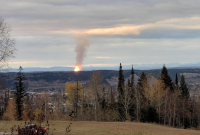The company that owns a natural gas pipeline that ruptured and burned in central British Columbia a week ago says the dust that settled on homes near the blast site does not pose a health risk.
The latest post on the Enbridge website says earth sampling near Prince George shows mineral and metal composition is well below provincial and federal standards for urban and residential areas.
Enbridge also says construction of an access road to the damaged line continues and repair crews may be able to reach the scene later this week, although the company has already said there is no timeline to return the 91-centimetre pipeline to service.
FortisBC, which distributes natural gas to about one million homes and businesses in B.C., is urging customers to limit non-essential use of the fuel while the line is shut off and a second, smaller pipeline is running at reduced capacity.
The Vancouver Park Board says it is doing its part to reduce consumption by turning down thermostats in parts of city-run buildings where there will be a minimal impact to the public, such as common and staffing areas.
Park board spokeswoman Margo Harper says heat in childcare centres, swimming pools and the on-demand heaters at ice rinks will not be affected.
Jen Fretz, civic operations director for the City of Kamloops, says the temperature of all pools and tubs — usually ranging from about 27 C to 40 C — will be lowered by 0.6 C; the temperature in buildings will be cut by 1 C to 22.5 C; utility and heated storage buildings' temperature will be slashed from 18 C to 5 C and the temperature of the hot water for Zambonis will be cut to nearly 63 C from about 74 C.
Fretz say radiant heaters will not be available for spectators at the city's four arenas until further notice, measures that may end up saving taxpayers' money in the long run.
"This has really caused us to look at our operations and in some cases we may want to keep these new temperatures," she says.
Most of the natural gas used by the city is for heating purposes, she says.
FortisBC spokesman Sean Beardow says British Columbians should continue conserving natural gas before repairs are done following an investigation by the Transportation Safety Board.
"We saw a 20 per cent drop in natural gas use from when we first put out the call," he said of the company's request on Oct. 10.
Beardow says some post-secondary schools have significantly reduced their gas consumption.
"If people can continue to be a little more stingy with their natural gas use we hope that we'll be able to continue essential natural gas services for every customer and not have to worry about things."



Comments
Is that the same dust that has been linked to a rare form of cancer that the people of Fort Chip have been suffering from?